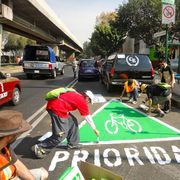One of the key operations of the modern city project concerns the vertical reorganisation of urban space in terms of a clear-cut distinction between the surface level of the city as a public space for new forms of exchange, leisure, sociality and subjectivity, and the underground level as an invisible space for the operation of urban infrastructures, especially sewage systems, gas and water pipes, wires, subways, etc. Such reorganisation went along with a bifurcation of the arts of governing the city: whereas representative democracy was necessary for organizing human life above ground, managing the underground seemed not to be a political issue, but a technoscientific one.
This lecture aims to unsettle the modern imaginary of infrastructures as invisible systems shaped by exclusively techno-scientific concerns and propose an empirical and conceptual exploration of current processes of politicization of the sociotechnical assemblages we call infrastructures. Engaging with recent calls, projects and initiatives proposing new forms of infrastructural subversion, hacking the city, open-source urbanism and citizen-based maintenance and repair of decaying infrastructures, I discuss the idea of a ‘right to infrastructure’. Interestingly, this right does not target infrastructure as a noun, but as a verb. Accordingly, it is not primarily concerned with the problem of access or exclusion from existing infrastructure services, but with people’s capacity to engage in the design and construction of their own infrastructures. More generally, I propose conceptualizing these developments in terms of the challenge of ‘technical democracy’ - the idea that the major current challenge to democracy involves the democratization of expertise and the collaboration among experts and lay people in processes of technology design, knowledge production and world making.
In the remainder of this lecture, I present a large EU-project aimed at implementing smart infrastructures in the city of Munich. More specifically, I introduce three conceptual principles that we are currently using for enabling processes of collaborative design of smart technologies and infrastructures.
Wann
03.02. 2016, 17h
Wo
Vorhoelzer Forum
TU München
Arcisstr. 21
80333 München
